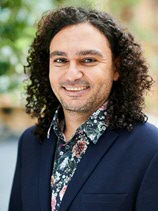Modelling and analysing the Colombian energy system to obtain short, medium and longer term scenario’s for Bio-based Economy for the national energy demand, supply mix and GHG mitigation potential | Ahmed Younis

Field | Discipline
- Energy, fuels and chemicals
- Land use
- Greenhouse gases mitigation
Expertise
- Energy system modeling (techno-economic optimization)
- Power system modeling (simulation)
- Statistical land use analysis
Summary
Bioenergy has for years been considered an important mitigation option for Greenhouse Gas (GHG) emissions, a key alternative for oil and an important opportunity to provide income and economic activity to rural regions, especially in developing countries. This has not fundamentally changed, but the recent debate has shown how complex the development of bio-based options and infrastructure is when possible key conflicts are to be avoided and the various expected benefits to be achieved. Few countries are so far geared up to this challenge. Colombia is one of the countries where the basic conditions for a future sustainable bio-based sector are positive. In terms of technical potential, there is a large and productive land base and considerable water availability with ample room for further efficiency increases. Moreover, the well-organized agricultural sector, physical and knowledge infrastructures bring an economic potential into perspective. Where such conditions overlap with combined priorities in policy to increase the role renewable energy, stimulate rural development, build competitive export oriented sectors and protect the environment; a significant implementation potential can be identified for Colombia to become an important player in the bio-based economy (BBE). Nevertheless, the general challenges for sustainable development of land-use and biomass production are valid for Colombia as well. Meeting key sustainability criteria, which exist and are under development worldwide, is an essential prerequisite to supply biomaterials and biofuels to the national and world market.
To address these challenges, the RVO-funded bilateral program BBE Colombia – NL* was established with the overall objective of providing a coherent and multi-sectoral strategy for development of sustainable bio-based sector in Colombia over time.
The main questions addressed by the program are formulated as:
- How can Colombia become a major producer of sustainable ‘’premium’’ bio-based products and energy carriers over time?
- What technologies, products and bioenergy production and supply chains are the most promising from economic, environmental point of view and how large is their sustainable market potential?
- How can the key preconditions to secure sustainable biomass production, avoid indirect land use change and (too strong) competition with food supplies, protect biodiversity and water management and achieve desired positive socio-economic benefits be met over time, in different regions and for different sectors?
- How does bioenergy fit in the overall development of the energy system of Colombia, what is the expected optimal use of biomass over time and what can be the role of the export markets for bio-solids and biofuels?
The work plan of the program includes three main and interlinked components (PhD projects): 1) Land use modelling to support zoning, sustainable land use planning and definition of sustainable biomass potential; 2) Energy system modelling to analyze short- to long-term energy demand and supply scenarios and GHG mitigation potential; and 3) Analysis of the implementation and implications of the introduction of state-of-the-art sustainability criteria for bio-based products. This research project is concerned with the second component of the work plan. The scope of the analysis will be on national scale with a selected local/regional scale case study. An integrated systems analysis approach will be used based on collaboration between program components and modelling tools. The main methods to be used will include soft-linking energy system optimization modelling, power system modelling, spatially explicit modelling, and macro-economic impact analysis.
* RVO funded, bilateral program BBE Colombia – NL (Full name: “Towards a long-term science and innovation collaboration between Colombia and the Netherlands in Biomass Valorisation”, RVO Reference number TF13COPP7B)
Supervision by
-
Promotor Prof. dr. A.P.C. (André) Faaij | Integrated Research on Energy, Environment and Society - IREES | ESRIG, University of Groningen.
-
Co-promotor Dr. R.M.J. Benders | Integrated Research on Energy, Environment and Society - IREES | ESRIG, University of Groningen.
More information and contact details can be found on the personal profile of Ahmed Younis
| Last modified: | 18 March 2025 2.51 p.m. |
